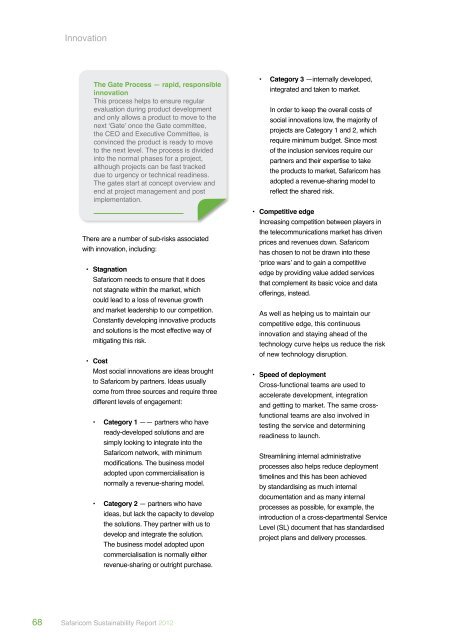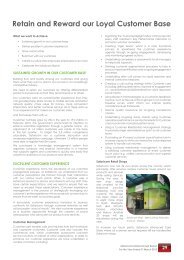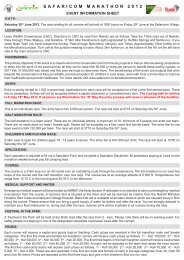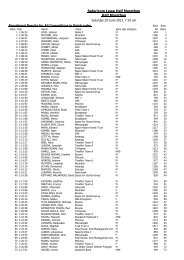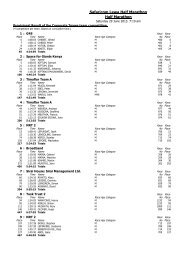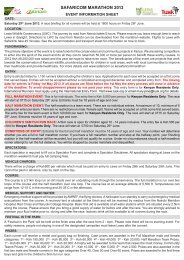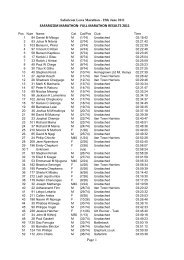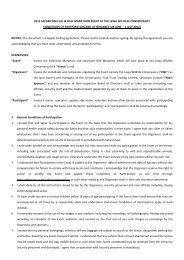Sustainability Performance: At a glance (31 March 2012) - Safaricom
Sustainability Performance: At a glance (31 March 2012) - Safaricom
Sustainability Performance: At a glance (31 March 2012) - Safaricom
You also want an ePaper? Increase the reach of your titles
YUMPU automatically turns print PDFs into web optimized ePapers that Google loves.
Innovation<br />
The Gate Process — rapid, responsible<br />
innovation<br />
This process helps to ensure regular<br />
evaluation during product development<br />
and only allows a product to move to the<br />
next ‘Gate’ once the Gate committee,<br />
the CEO and Executive Committee, is<br />
convinced the product is ready to move<br />
to the next level. The process is divided<br />
into the normal phases for a project,<br />
although projects can be fast tracked<br />
due to urgency or technical readiness.<br />
The gates start at concept overview and<br />
end at project management and post<br />
implementation.<br />
There are a number of sub-risks associated<br />
with innovation, including:<br />
• Stagnation<br />
<strong>Safaricom</strong> needs to ensure that it does<br />
not stagnate within the market, which<br />
could lead to a loss of revenue growth<br />
and market leadership to our competition.<br />
Constantly developing innovative products<br />
and solutions is the most effective way of<br />
mitigating this risk.<br />
• Cost<br />
Most social innovations are ideas brought<br />
to <strong>Safaricom</strong> by partners. Ideas usually<br />
come from three sources and require three<br />
different levels of engagement:<br />
• Category 1 —— partners who have<br />
ready-developed solutions and are<br />
simply looking to integrate into the<br />
<strong>Safaricom</strong> network, with minimum<br />
modifications. The business model<br />
adopted upon commercialisation is<br />
normally a revenue-sharing model.<br />
• Category 2 — partners who have<br />
ideas, but lack the capacity to develop<br />
the solutions. They partner with us to<br />
develop and integrate the solution.<br />
The business model adopted upon<br />
commercialisation is normally either<br />
revenue-sharing or outright purchase.<br />
• Category 3 —internally developed,<br />
integrated and taken to market.<br />
In order to keep the overall costs of<br />
social innovations low, the majority of<br />
projects are Category 1 and 2, which<br />
require minimum budget. Since most<br />
of the inclusion services require our<br />
partners and their expertise to take<br />
the products to market, <strong>Safaricom</strong> has<br />
adopted a revenue-sharing model to<br />
reflect the shared risk.<br />
• Competitive edge<br />
Increasing competition between players in<br />
the telecommunications market has driven<br />
prices and revenues down. <strong>Safaricom</strong><br />
has chosen to not be drawn into these<br />
‘price wars’ and to gain a competitive<br />
edge by providing value added services<br />
that complement its basic voice and data<br />
offerings, instead.<br />
As well as helping us to maintain our<br />
competitive edge, this continuous<br />
innovation and staying ahead of the<br />
technology curve helps us reduce the risk<br />
of new technology disruption.<br />
• Speed of deployment<br />
Cross-functional teams are used to<br />
accelerate development, integration<br />
and getting to market. The same crossfunctional<br />
teams are also involved in<br />
testing the service and determining<br />
readiness to launch.<br />
Streamlining internal administrative<br />
processes also helps reduce deployment<br />
timelines and this has been achieved<br />
by standardising as much internal<br />
documentation and as many internal<br />
processes as possible, for example, the<br />
introduction of a cross-departmental Service<br />
Level (SL) document that has standardised<br />
project plans and delivery processes.<br />
• Consumer awareness<br />
To keep our customers engaged and<br />
loyal, <strong>Safaricom</strong> is focusing on social<br />
innovations that meet health, education<br />
and agriculture needs. These innovations<br />
give our customers a reason to remain with<br />
<strong>Safaricom</strong> as the competition grows.<br />
Stakeholder group<br />
Medical service providers<br />
Agriculture service providers<br />
Education service providers<br />
Content aggregators<br />
What we engage them on:<br />
As well as developing solutions, <strong>Safaricom</strong><br />
needs to ensure its target markets are aware<br />
of them and has adopted an innovative below<br />
and through-the line marketing approach,<br />
which keeps communication costs low while<br />
effectively generating the required levels of<br />
customer awareness.<br />
These partners provide the required medical expertise and are also<br />
responsible for running our mobile health services. They get the<br />
necessary approvals from the medical regulators and indemnify<br />
<strong>Safaricom</strong> from any medical responsibility.<br />
In running Daktari-1525, a tele-triage service, for example, Call-adoc<br />
Ltd is responsible for recruiting and scheduling doctors, getting<br />
the required approvals from health boards and ensuring patient<br />
confidentiality is maintained, while we are responsible for keeping the<br />
service level high, for marketing the service and for ensuring service<br />
uptake is above the necessary thresholds.<br />
These partners offer the agricultural expertise required to run our<br />
agro-based services, while we provide the enabling technology for<br />
farmers to access services, content and information. In this instance,<br />
our partners champion the interactions with farmers.<br />
These partners are experts in education and are approved by the<br />
Kenya Institute of Education (KIE). Our engagement with them is to<br />
provide learning courses and content on a revenue-share basis.<br />
These partners are responsible for ensuring course content quality and<br />
we provide the platform to manage online and mobile learning. As in<br />
other services, <strong>Safaricom</strong> provides integration into payment systems<br />
for the courses and content.<br />
These are VAS providers licensed by the CCK to offer content to<br />
network operators.<br />
<strong>Safaricom</strong> engages with content aggregators on a revenue-share<br />
basis. <strong>Safaricom</strong> provides them with connectivity and access to the<br />
<strong>Safaricom</strong> network elements to facilitate their services.<br />
68 <strong>Safaricom</strong> <strong>Sustainability</strong> Report <strong>2012</strong> <strong>Safaricom</strong> <strong>Sustainability</strong> Report <strong>2012</strong> 69<br />
Innovation<br />
Stakeholders with whom we engage<br />
From an innovation perspective, our key stakeholders include: our shareholders, customers, solution<br />
partners, NGOs, universities, research organisations, regulators and various Government ministries. The<br />
table below describes each stakeholder group and what we engage them on.


